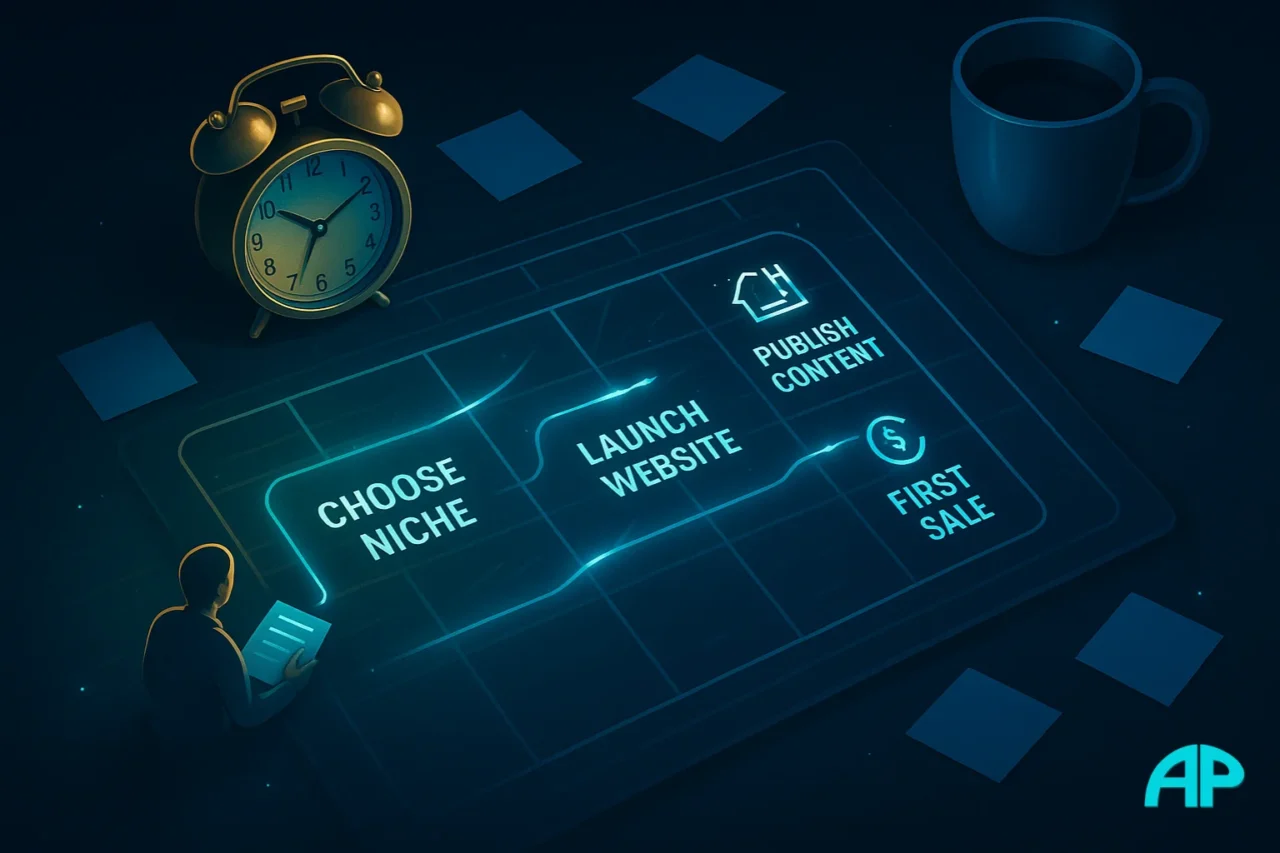
Step-by-step guidance to help you start, grow, and profit with affiliate marketing from scratch
Starting with affiliate marketing for beginners can feel overwhelming, but it does not have to be. This guide will walk you through every step so you can launch, grow, and profit from your own affiliate business with confidence.
Table of Contents
- Read This First: Beginners Win
- Affiliate Marketing Basics Guide
- History of Affiliate Marketing
- Why Affiliate Marketing Works Now
- Choose a Niche for Beginners
- Best Affiliate Programs to Join
- Beginner Platform Setup Guide
- Content Tips for Affiliate Sales
- Driving Traffic for Beginners
- Tracking and Scaling Your Sales
- Avoid Beginner Affiliate Mistakes
- Tools for Affiliate Beginners
- 90 Day Beginner Action Plan
- FAQ: Affiliate Beginner Questions
- Final Tips for Affiliate Success
Read This First: How Beginners Win at Affiliate Marketing
Two Extremes You’ll See Online
If you have ever Googled affiliate marketing for beginners, you have probably seen two extremes. On one side are the “get rich in 30 days” dream sellers promising Lamborghinis and private islands. On the other are the doom-and-gloom naysayers claiming affiliate marketing is dead.
The Real Truth About Affiliate Marketing
Affiliate marketing is neither a magic money faucet nor a relic of the past. It is a real, sustainable way to earn online if you approach it with a plan, patience, and the right mindset. Think of it as a business you can start without rent, inventory, or payroll headaches. You do not need to build a product, run a warehouse, or even quit your job today.
What You Really Need to Succeed
To get started, you need:
- A clear niche that excites you and has an audience
- Products or services worth recommending
- A platform to share your message, whether that is a blog, video, email list, or social media
What You’ll Learn in This Guide
This guide will help you skip rookie mistakes and start building momentum from day one. You will discover:
- Affiliate marketing basics explained in plain English
- How to choose a niche that is both profitable and fun
- Where to find affiliate programs for beginners that actually pay
- How to create content people trust and click
- Ways to grow your traffic without overspending
By the end, you will know how to launch, grow, and scale your affiliate business while avoiding time-wasting distractions. So grab a coffee, ditch the hype, and turn your curiosity into a clear, actionable game plan.
Affiliate Marketing for Beginners: The Simple Truth
At its core, affiliate marketing is simply recommending something you like to people who might need it and earning a commission when they buy. There is no smoke, no hidden tricks, and certainly no confusing jargon.
When we talk about affiliate marketing for beginners, here is the short version:
- A company creates a product or service.
- You sign up as an “affiliate” (also called a partner or promoter).
- They give you a special tracking link.
- You share that link in your content, maybe a blog post, YouTube video, email, or social media post.
- When someone clicks it and makes a purchase, you earn a commission.
It is like being a digital middleman or woman. You do not have to make the product, store it, ship it, or handle customer support. Your main job is connecting people with solutions they actually want.
A Quick Example
Let us say you are into fitness. You join an affiliate program for a company that sells adjustable dumbbells.
- You create a blog post: “Best Dumbbells for Small Spaces.”
- In that article, you include your affiliate link to the dumbbells.
- A reader clicks, buys, and you earn a commission.
That is affiliate marketing in action. It works across almost any niche you can think of including travel, tech, cooking, personal finance, pets, hobbies, and more.
The History and Growth of Affiliate Marketing

The Birth of Affiliate Marketing Online
Affiliate marketing might feel like a modern invention, but its roots stretch back further than most beginners realise.
The first recognised affiliate program was launched in 1996 by Amazon. They pioneered the model of rewarding website owners with a commission every time they referred a customer who made a purchase. At the time, it was revolutionary: ordinary bloggers, hobbyists, and webmasters suddenly had a way to monetise their content without creating their own products.
Affiliate Marketing Growth in the Early Internet Era
Through the late 1990s and early 2000s, affiliate marketing expanded rapidly. Networks like Commission Junction, ClickBank, and ShareASale emerged, creating marketplaces where affiliates could easily connect with merchants. This growth coincided with the explosion of personal websites and the early days of blogging.
Social Media and the Rise of Modern Affiliate Programs
The 2010s brought another major wave of expansion. With the rise of social media, YouTube, and influencer marketing, affiliate marketing found entirely new platforms. A simple product review on YouTube or a recommendation in a blog post could reach millions. At the same time, tools like tracking cookies, analytics dashboards, and AI-powered reporting made the entire process more sophisticated.
Affiliate Marketing Industry Today
Today, affiliate marketing has grown into a multi-billion-dollar global industry. According to recent estimates, the affiliate marketing industry will exceed $15 billion in annual spend worldwide. It continues to evolve alongside technology, with new opportunities in areas like mobile apps, subscription services, and influencer-driven ecommerce.
Why Affiliate Marketing Still Matters for Beginners
What began as a quirky Amazon experiment is now one of the most reliable, scalable, and beginner-friendly ways to earn online. Its growth story proves one key point: affiliate marketing isn’t a fad — it’s a business model that adapts and thrives as digital platforms change.
Why Affiliate Marketing for Beginners Works So Well
For companies, affiliate marketing is a low-risk way to get sales because they only pay when a sale happens. For you, it is a low-cost way to start an online business without needing your own products.
We will get into the nuts and bolts like affiliate marketing basics explained, choosing the right programs, and beginner affiliate marketing strategies in the sections ahead.
For now, just remember this: affiliate marketing is about trust first and commission second. When you help people solve real problems, the income follows naturally.
Why Affiliate Marketing is Perfect for Beginners
If you are starting from scratch, affiliate marketing for beginners offers one of the most accessible paths to earning money online. You do not need to reinvent the wheel or gamble on a risky business idea. You can step into a proven model that has been working for years.
1. Low Startup Costs
Traditional businesses can drain your bank account before you make your first sale. With affiliate marketing, your initial costs can be as low as a website domain, hosting, and a few essential tools. You are not paying for inventory, storage, or shipping.
2. Flexible Lifestyle
Whether you want to work during your lunch break, from your kitchen table, or while travelling, affiliate marketing allows you to set your own schedule. You decide how much time to invest and when to invest it.
3. Scalable Potential
In the beginning, you might earn a few small commissions. Over time, with consistent content creation and traffic growth, those earnings can increase significantly. Unlike a job where you are limited by hourly pay, affiliate income can grow without adding more hours to your day.
4. Leverage Skills You Already Have
Love writing? Start a blog. Comfortable in front of a camera? Launch a YouTube channel. Prefer quick, punchy posts? Use social media platforms. You can choose a method that plays to your strengths, making the process far more enjoyable.
5. Endless Niches to Explore
From fitness and personal finance to home improvement and travel, there is a niche for almost any interest. The trick is finding one that combines your passion with audience demand. We will cover exactly how to do this in the next section on choosing your niche.
When you combine low costs, flexibility, scalability, and the ability to work with topics you enjoy, it is easy to see why affiliate marketing remains a top choice for beginners. Once you understand the basics, you can apply beginner affiliate marketing strategies that set you up for long-term success.
How to Choose Your Niche in Affiliate Marketing

Choosing a niche is one of the most important steps in affiliate marketing for beginners. Your niche determines what products you promote, the type of audience you attract, and how much competition you face. Get this part right and you set yourself up for long-term growth.
Start with Your Interests
It is easier to create content about something you already enjoy. Think about the topics you naturally talk about with friends, the hobbies you invest time in, or the problems you have solved for yourself. When you genuinely care about a subject, your enthusiasm comes through in your content and your audience can feel it.
Check the Profit Potential
Passion is important, but you also want a niche that can make money. Look at whether there are products or services in that space with affiliate programs that pay decent commissions. Search for related terms online and see if companies are actively advertising in that niche. If they are spending money on ads, there is usually demand.
Find the Sweet Spot Between Broad and Narrow
Go too broad and you will struggle to stand out. Go too narrow and you may not have enough products or topics to keep your audience engaged. For example, instead of choosing “fitness” as a whole, you might focus on “home fitness for busy parents” or “strength training for over 40s.”
Research the Competition
Type your niche idea into Google and see who is ranking. Check if there are blogs, YouTube channels, or social media accounts successfully covering the topic. A little competition means there is an audience, but you will want to find your own unique angle so you are not just repeating what others say.
Test Before You Commit
You do not have to lock yourself into one niche forever. Start creating a few pieces of content and see how they perform. Pay attention to engagement, traffic, and which products seem to resonate with your audience.
Choosing the right niche is the foundation of your affiliate marketing business. When your topic has both personal appeal and profit potential, you will find it much easier to stay consistent and motivated. This is the point where affiliate marketing for beginners can go from an idea to an actual business plan.
Picking the Right Affiliate Programs for Beginners

Once you know your niche, the next step in affiliate marketing for beginners is choosing affiliate programs that fit your audience. The right programs will help you build trust, earn more per sale, and create a business that lasts. The wrong ones can waste your time and damage your credibility.
Look for Products You Believe In
Only promote products or services you would recommend to a friend or use yourself. Your reputation is your biggest asset. If you push low quality offers, you might make a quick sale, but you will lose long term trust.
Understand the Commission Structure
Commissions can range from a few percent to over fifty percent depending on the product type. Digital products often pay higher rates than physical ones. Also pay attention to recurring commissions, where you earn each time the customer renews or pays their subscription.
Check the Cookie Length
A cookie is the tracking period that determines how long after someone clicks your link you can still earn a commission. Longer cookie lengths are usually better, as they give people more time to make a buying decision.
Evaluate Program Credibility
Look at the company’s track record, customer reviews, and online presence. If the product has a history of complaints or bad service, it could reflect poorly on you. Choose programs from reputable merchants with clear payment terms.
Balance High Ticket and Low Ticket Offers
High ticket items bring in larger commissions but may take longer to sell. Low ticket items can sell more frequently but pay less per sale. A mix of both can help you create a steady income stream while still aiming for bigger payouts.
When you choose affiliate programs that align with your niche, values, and audience needs, you set the stage for sustainable earnings. In the next section, we will look at how to set up your platform so you have a home base to share your recommendations and grow your audience.
Setting Up Your Platform for Affiliate Marketing Results
Now that you have chosen your niche and found affiliate programs that fit, it is time to create a platform where you can share your recommendations. This is one of the most important steps in affiliate marketing for beginners because your platform is the place where you build trust, publish content, and guide people toward the products you promote.
Choose Your Main Platform
You have several options for where to focus your efforts. The most common choices are:
A Blog or Website
A blog is one of the most versatile platforms. It allows you to create long-form content, rank in search engines, and grow an email list. You own the space, which means you have control over your content and audience. If you’re just starting out, check out my guide on how to start a blog and turn your passion into profit.
A YouTube Channel
Video content builds trust quickly because people can see and hear you. You can create reviews, tutorials, or comparisons that include your affiliate links in the video description.
Social Media Accounts
Platforms like Instagram, TikTok, and Facebook can help you reach people quickly, but they rely on algorithms you do not control. Social media is great for engagement, but it is best to combine it with a website or email list you own.
Get the Right Tools in Place
If you are starting a blog, you will need a domain name and web hosting. Use a simple and memorable domain that reflects your niche. For video content, invest in a decent microphone and good lighting. If you plan to use social media, set up professional looking profiles with clear bios that tell people who you are and what you offer.
Build a Home Base You Own
Even if you begin on social media, create a website or landing page as soon as possible. This gives you a place to collect email addresses and keep control of your audience. Social media accounts can be shut down or change rules overnight, but your own website is an asset you control completely.
Your platform is the stage for everything you will do next. Once it is set up, you can start publishing content that attracts your ideal audience and positions you as a trusted source. In the next section, we will dive into how to create content that not only gets attention but also leads to sales.
Content That Converts: Affiliate Marketing Tips for Beginners
Your platform is ready, your niche is clear, and you have joined the right affiliate programs. Now it is time to create content that inspires people to take action. In affiliate marketing for beginners, the goal of your content is not just to get views or clicks. It is to help your audience solve problems and make confident buying decisions.

Focus on Value First
Before you think about making a sale, focus on giving genuine value. Answer questions, share personal experiences, and guide your audience toward the best solution for their needs. When you help people first, trust naturally leads to conversions.
Content Formats That Work Well for Beginners
Product Reviews
Share your honest opinion about a product or service. Include the benefits, drawbacks, and who it is best for. Transparency builds credibility.
Comparison Posts
People love side by side comparisons. Show the differences between two or more options, explaining which is best for different situations.
How To Guides and Tutorials
Teach your audience how to do something step by step, and recommend the tools or products they will need along the way.
List Posts and Resource Roundups
Create a list of top products, tools, or resources within your niche. Make sure each one links to your affiliate offer.
Use Storytelling to Connect
Facts and features are useful, but stories create emotional connections. Share how a product solved a problem for you or a customer. Stories make your recommendations relatable and memorable.
Include Clear Calls to Action
Do not assume your audience knows the next step. If you want them to click your affiliate link, tell them exactly where to find it and what to expect. Simple instructions can make a big difference in your click through rate.
When you consistently publish valuable, trust building content, you create a loyal audience that listens to your recommendations. This is the point where affiliate marketing tips for beginners become practical action steps, and where your first commissions start to roll in.
Driving Traffic to Your Affiliate Offers as a Beginner
You can have the best niche, the most helpful content, and the highest-paying affiliate programs, but without traffic your business goes nowhere. In affiliate marketing for beginners, traffic is the lifeblood. More importantly, you want the right traffic — people who are already interested in what you are promoting.
Focus on Quality Over Quantity
Not all traffic is equal. A small group of targeted visitors who trust your recommendations will make you more sales than thousands of random clicks. Aim for visitors who have a genuine interest in your niche and are likely to take action.
Free Traffic Methods for Beginners
Search Engine Optimisation (SEO)
Learn the basics of SEO so your content can appear in Google searches. Target long tail keywords that match what your audience is looking for. Over time, well-optimised content can bring you consistent, free traffic.
Social Media Content
Post regularly on platforms where your audience spends time. Short videos, reels, and image posts can grab attention and lead people back to your website, YouTube channel, or email list.
Email Marketing
Start building an email list from day one. Offer a free resource to encourage sign-ups and then send helpful tips, stories, and product recommendations. This is one of the most reliable ways to reach your audience without relying on algorithms.
Communities and Forums
Get involved in online groups related to your niche. Answer questions and share insights, linking to your content only when it is genuinely helpful.
Paid Traffic Methods for Beginners
Google Search Ads
Target people who are actively looking for solutions. You can direct them to blog posts, reviews, or dedicated landing pages that include your affiliate links.
Social Media Ads
Platforms like Facebook, Instagram, and TikTok let you target specific demographics and interests. Paid ads can help you test offers quickly and find what works.
Native Advertising
These ads blend into the content on a site and can work well for driving people to articles or guides that lead naturally to your affiliate offers.
Start Small and Scale
Begin with one or two traffic sources. Learn how to use them effectively, measure your results, and then scale the ones that work. Spreading yourself too thin across many platforms usually leads to poor results.
For affiliate marketing beginners, mastering a few solid traffic strategies is the fastest way to get your first sales and build a reliable income stream.
Tracking, Optimising, and Scaling in Affiliate Marketing

Once you start getting traffic and making a few sales, the next step in affiliate marketing for beginners is to track what is working, improve it, and scale it up. This is how you turn a side hustle into a reliable income stream.
Track Your Results
You cannot improve what you do not measure. Use tools like Google Analytics, your affiliate dashboard, and link tracking software to see which pieces of content are driving the most clicks and sales. Pay attention to your top performing pages or videos so you can learn what your audience responds to.
Optimise for Better Conversions
Small changes can lead to bigger results. Test different headlines, calls to action, and content formats. You might find that a different product image, a clearer link placement, or a stronger opening paragraph increases clicks and sales. Focus your time on improving the content that already brings in traffic before creating new pieces.
Scale What Works
When you know which topics, products, and traffic sources are most profitable, double down on them. Create more content on similar topics, expand into related keywords, or run ads to your highest converting pages. Consider adding similar affiliate programs to offer your audience more options.
Scaling does not always mean working more hours. It often means working smarter by investing time and resources into the strategies that are already paying off.
Tracking, optimising, and scaling is where affiliate marketing success tips turn into long term growth. By focusing on the numbers and making data driven decisions, you give yourself the best chance of building an affiliate business that lasts.
Common Mistakes in Affiliate Marketing for Beginners
Starting out in affiliate marketing for beginners can be exciting, but it is easy to trip over a few avoidable mistakes. These errors can slow your progress or even stop you from earning altogether. Knowing what they are helps you avoid them from day one.
Choosing a Niche That Is Too Broad or Too Narrow
If your niche is too broad, you will be competing with established websites and big brands. If it is too narrow, you may run out of topics to cover or find there are not enough products to promote. Aim for a niche that has demand but is focused enough to stand out.
Promoting Low Quality Products
It might be tempting to promote anything that pays a good commission, but recommending low quality products will hurt your credibility. Only promote products you trust and would personally use.
Quitting Too Soon
Affiliate marketing is not a get rich quick plan. It can take months to see results, especially if you are building organic traffic. Many beginners give up before they reach their first sale, not realising they were close to a breakthrough.
Ignoring Analytics
Without tracking your results, you will have no idea what is working and what is wasting time. Analytics show you which content is performing and where your sales are coming from so you can focus your energy on the right things.
Overloading with Links
Stuffing your content with too many affiliate links can make it look spammy and turn readers away. Focus on placing links where they are most relevant and helpful to the reader.
Avoiding these mistakes will save you frustration and keep you moving toward your goals. When you combine patience, persistence, and smart strategy, your chances of success increase dramatically.
Recommended Tools and Resources for Beginner Affiliate Marketers
The right tools can make a big difference in affiliate marketing for beginners. They help you save time, improve the quality of your work, and track your progress more effectively. While you can start with very little, having a few key resources will speed up your results.
Website and Hosting
If you are building a blog or website, choose a reliable hosting provider with good customer support. Look for one that offers fast loading speeds, secure servers, and easy WordPress installation. Your website is your home base, so reliability matters.
Keyword Research Tools
Knowing what your audience is searching for is essential. Tools like Google Keyword Planner, Ubersuggest, or paid options such as Ahrefs and Semrush can help you find profitable keywords and content ideas.
Email Marketing Platforms
Building an email list allows you to stay in touch with your audience and promote offers directly. Platforms like ConvertKit, AWeber, or MailerLite are beginner friendly and have automation features that save time.
Link Tracking Tools
Track the performance of your affiliate links to see which ones are getting the most clicks and conversions. Tools like Pretty Links or ThirstyAffiliates also make your links look cleaner and more professional.
Graphic and Video Tools
High quality visuals make your content stand out. Canva is great for creating images and infographics, while tools like CapCut or ScreenPal can help you edit videos for YouTube or social media.
Having these tools in place will help you work more efficiently and create content that attracts and converts your ideal audience. In the next section, we will put it all together with a realistic 90 day plan to get your affiliate marketing business moving.
Your First 90 Days Plan for Affiliate Marketing Success

Getting started with affiliate marketing for beginners can feel overwhelming, so having a clear roadmap helps you stay focused and avoid distractions. This 90 day plan breaks your journey into manageable steps so you can build a solid foundation without burning out.
Days 1 to 30 – Laying the Groundwork
Choose your niche and join two or three affiliate programs that fit your audience. Set up your main platform, whether that is a blog, YouTube channel, or social media account. Create at least three pieces of high quality content that provide value and naturally include your affiliate links. Begin basic keyword research so your future content is targeted toward what people are actually searching for.
Days 31 to 60 – Growing Your Presence
Publish new content consistently, aiming for at least one to two pieces per week. Share your content on social media and in relevant online communities. Start collecting email addresses with a simple sign up form and offer a free resource related to your niche as an incentive. Continue learning about SEO and apply basic optimisation techniques to your existing posts.
Days 61 to 90 – Optimising and Building Momentum
Review your analytics to see which content is driving the most clicks and sales. Improve those pieces with stronger calls to action, updated information, or better visuals. Increase your promotion efforts by testing different traffic sources such as search ads or social media ads. Continue creating content, but also focus on refining your strategy based on what the data shows is working.
By following this plan, you will have a functioning affiliate marketing business within 90 days. You will also have enough data to make informed decisions about where to focus your time for the best results. In the next section, we will wrap up with some final thoughts on how to keep building from here.
FAQ: Common Questions About Affiliate Marketing for Beginners
What is the easiest way to start affiliate marketing?
The easiest way for beginners is to choose a niche you care about, join one or two reputable affiliate programs, and start creating content that helps people. A simple blog or YouTube channel is a great starting point because it allows you to publish evergreen content that can bring in traffic for years.
How much money can a beginner make with affiliate marketing?
There is no fixed amount, but many beginners start with small commissions that grow over time. It might take a few months to reach your first sale, but with consistent effort, it is possible to earn a part time or even full time income. Your results depend on your niche, traffic, and how well you convert visitors into buyers.
Do I need a website to start?
A website is recommended because it gives you full control over your content and audience, but it is not essential. You can start on platforms like YouTube, TikTok, or Instagram. However, over time, having your own website will make it easier to build long term stability.
How long before I see results?
It can take anywhere from a few weeks to several months before you see noticeable results. Affiliate marketing is a long term strategy, and building trust with your audience takes time. Consistency in publishing and promoting your content is key.
Which affiliate programs are best for beginners?
Look for programs that have good commission rates, reliable tracking, and products that match your niche. Amazon Associates, ClickBank, CJ Affiliate, and ShareASale are popular starting points. You can also find niche specific programs by searching for “[your niche] + affiliate program.”
Can I do affiliate marketing with no money?
Yes, but having a small budget for a domain name, hosting, or better equipment will make the process smoother. If you start with no money, focus on free platforms and organic traffic strategies until you can reinvest your earnings
Is affiliate marketing still worth it?
Absolutely. As long as people shop online, there will be opportunities for affiliate marketers. The key is to focus on delivering real value and adapting to changes in platforms, trends, and consumer behaviour.
Final Thoughts on Winning at Affiliate Marketing for Beginners
Affiliate marketing for beginners is one of the most accessible and flexible ways to build an online income. It does not require a big budget, an advanced skill set, or a complicated business plan to get started. What it does require is commitment, patience, and a willingness to keep learning as you go.
If you follow the steps in this guide, you already have the framework for success. You know how to choose a niche, find quality affiliate programs, set up your platform, create content that converts, and drive targeted traffic to your offers. You also understand the importance of tracking your results, avoiding common mistakes, and building on what works.
The path is straightforward, but it is not effortless. Some days you will feel like you are making huge progress. Other days it may seem like nothing is happening. The secret is to stay consistent and remember that every piece of content you publish is another opportunity to earn.
You have the tools and the knowledge. Now it is about taking action. Start small, stay focused, and keep going even when the results are slow to appear. Your first commission is just the beginning of what you can achieve if you treat this like a real business.
